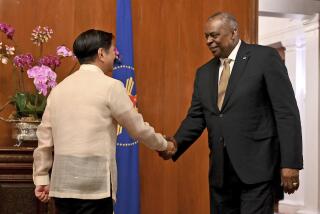Mission to Manila: a Balancing Act : Hopes For Stability Still Lie Between Aquino and Marcos
- Share via
President Reagan’s emissary, Ambassador Philip C. Habib, will not be a welcome visitor in the Philippines. But, as the former U.S. special envoy to the Lebanon negotiations, Habib is no stranger to crisis; with the right signals from Washington, he might be able to help the Philippines ease back from the brink of disaster.
Suspicion and mistrust of the United States is at an all-time high in our former colony. President Ferdinand E. Marcos and those around him resented Washington’s dispatch of a team to observe last week’s election. Now they are furious with the observers’ accusations of vote fraud, and with the calls in the American press and Congress for sanctions against Manila in the aftermath of what almost everyone agrees was a rigged election.
Opposition leader Corazon A. Aquino is just as resentful. She is angry at Reagan for his unwillingness to single out Marcos for criticism, and she sees statements emanating from the White House as evidence of American support for the Philippine leader despite his manipulation of the vote.
Habib’s message to Marcos should be simple and direct. The Philippine president should know that the United States is not pleased with the conduct of the elections, that our economic and military aid will continue to flow but only if used for needed reforms, and that we expect him to work with, rather than against, the legitimate opposition represented by Aquino.
To bolster his case, Habib needs to make only two points: that there is mounting pressure in the United States to adopt an anti-Marcos posture, and that the communist insurgency’s challenge to Marcos is sure to gain strength in the election’s controversial aftermath.
With Aquino, Habib has an even more difficult task. He must try to convince her and church leaders alike that taking to the streets to conduct a campaign of civil disobedience would be counterproductive. Any such sign of strength would only give Marcos an excuse to call out the army and the police, the majority of whom remain loyal to him, and use force to accomplish what he could not at the polls. A new period of martial law would be a real possiblity.
Aquino’s goal should be to live to fight another day, to build on her strong electoral showing and contest the municipal elections scheduled for May, and to continue to organize so that she can maintain influence in the long term. She must work for the post-Marcos transition, rather than behave in a manner that would give the ailing president and his would-be heirs the opportunity to preempt any chance of a democratic succession.
Washington can help Habib succeed. Publicly, the U.S. government should not refrain from making known its disappointment with the Marcos government’s conduct of the election. Our posture ought to be one of reluctant acknowledgment of the election results, not support. Aquino should be invited to Washington soon and afforded the same treatment as opposition leaders of other key friendly countries.
The Administration should fight those in Congress who are proposing that aid be reduced or placed in some escrow account. Such a step could result in Marcos denying us full access to our bases in the Philippines before we have prepared alternatives. It might also strengthen his hand, allowing him to tap the rising tide of nationalist sentiment. In turn, we would be left with less influence just when we need to muster all the limited influence that we have.
What is required is a delicate balancing act, one that would provide ongoing but highly conditional support to President Marcos coupled with a reaching out to an opposition that is feeling betrayed and frustrated. This approach will not satisfy those who want an unequivocal American stance denouncing Marcos. But it may contribute to a defusing of the current crisis in the Philippines while setting in motion a process that will improve the odds of democracy prevailing in that country. What is at issue is not American support for Philippine democracy, but rather the best way to bring it about.
More to Read
Sign up for Essential California
The most important California stories and recommendations in your inbox every morning.
You may occasionally receive promotional content from the Los Angeles Times.











